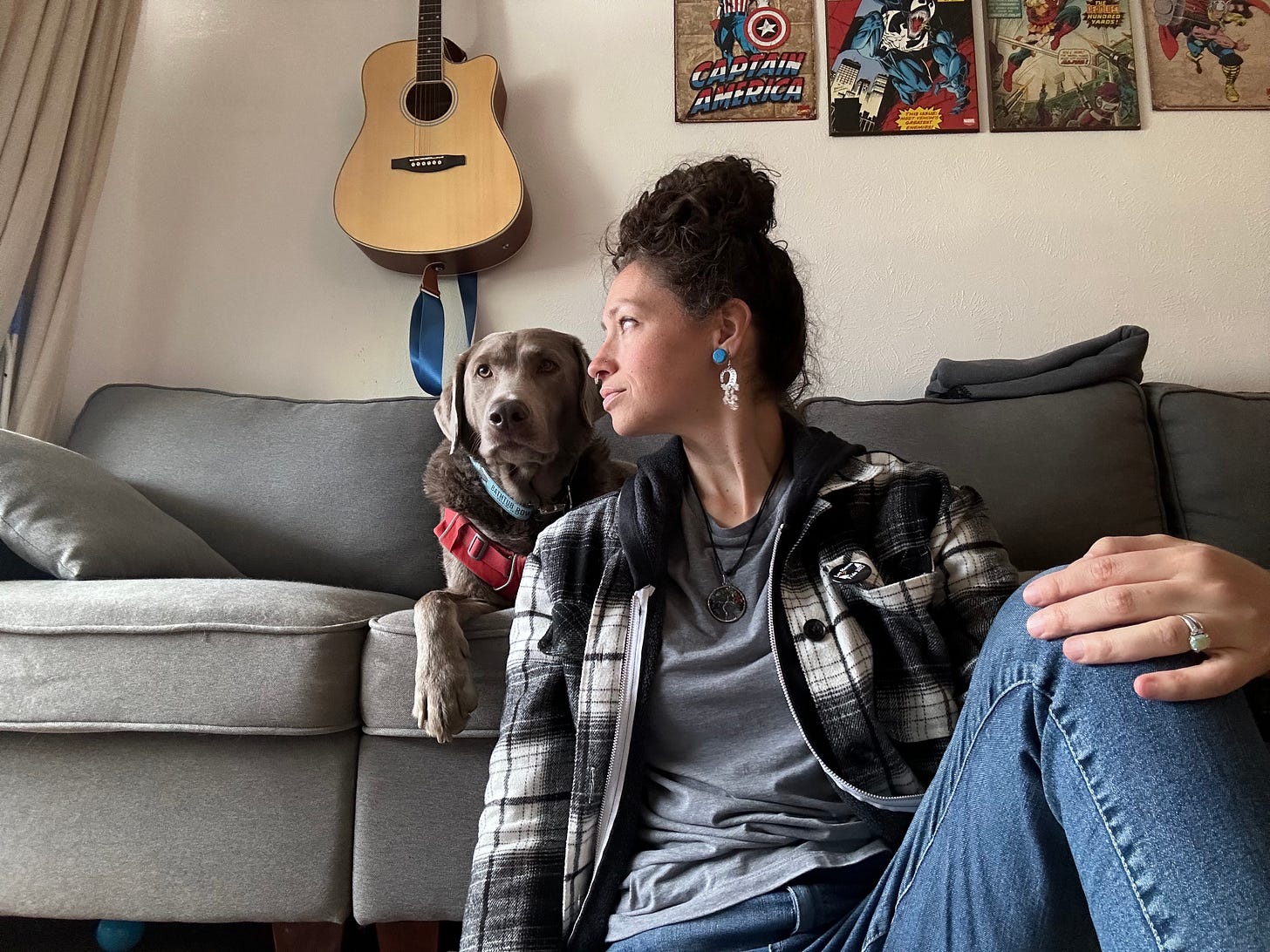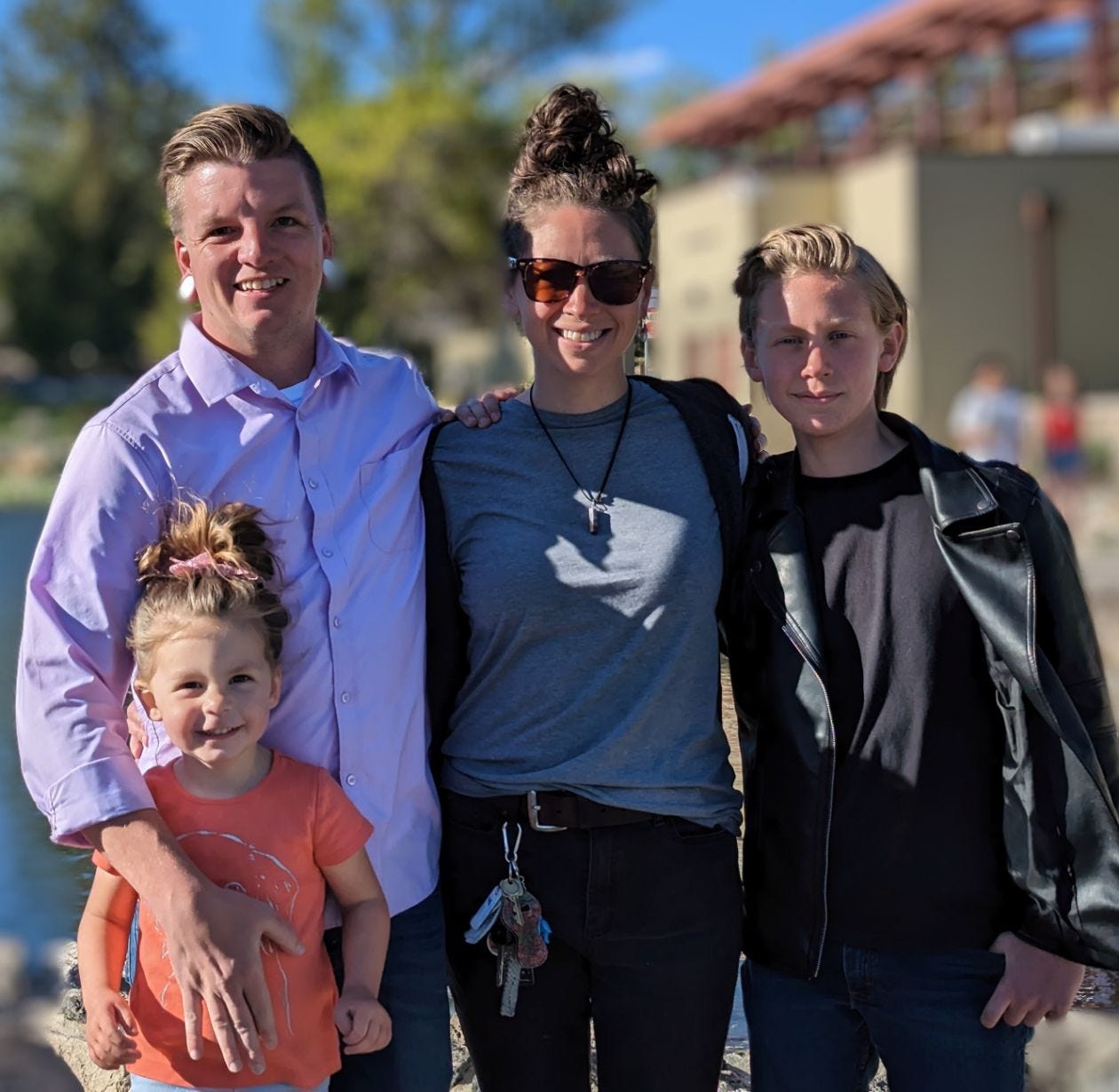Art and Mental Health Interview with Writer Samantha Rose McRae
A journey through depression, storytelling, writing to heal and one woman's experience of a creative life ...
I am excited today to have an interview with
, author of the Substack I Have Thoughts. I am also grateful to Sam for being today’s stop on the virtual book tour for The Artist’s Mind, so when you’re done learning about her from this interview, do pop over there and read her review of the book! First, though, enjoy her words as we discuss her experience of how writing relates to mental health, what telling stories means to her, and how it all fits into the bigger picture of a human life.Update: Since this interview, Samantha has changed the name of her Substack:
About Samantha
Samantha is a storyteller who says, “I like to experiment with creative writing inspired by walks through town, stories I listen to, people I meet, art I see, places I go.” She shares personal essays and vignettes about the human experience as she experiences them herself, as well as themes of mental health, faith, and the people of her life.
One of my favorite posts from Samantha is the insight and experience she shares in I Have Depression.
Interview with Samantha
What does mental health mean to you? What would you like to share about your own mental health/wellness journey?
Mental health to me is how one is able to experience everyday life. We all have days when we feel overwhelmed or unfulfilled, but when we begin to have chronic experiences that prevent us from experiencing life overall in a healthy or positive way, we may consider we are struggling with mental health. Be it depression or anxiety or something more akin to bi-polar disorder or schizophrenia, we experience life uniquely based on how our brains are wired. If there is some way to show up everyday in a way that makes us feel stronger and healthier (such as medication, therapy, full-time care, etc), we all deserve to have access to that care without it being stigmatized.
I have struggled with depression since I was about 10 years old. I believe it was both inherited from my parents, as well as inflamed by various experiences in my life. It took nearly 17 years before I finally decided I needed to try medication to help me cope with normal life because I was so afraid it meant I was too weak or too self-obsessed. After having my second child, I experienced postpartum depression (also in the middle of COVID shutdown) in such a strong way I couldn't recognize myself some days. When I decided to go back on medication for the second time (I had stopped while I was pregnant), I noticed a change within a week. I wasn't as angry, I could see situations more clearly, I wasn't completely overwhelmed by just waking up.
That is why I am such an advocate of talking about mental health now- we need to know that everyone struggles to some degree and no one should have to feel alone in their struggle.
I can absolutely relate to a lot of that. I didn’t receive a diagnosis or treatment for depression until my late twenties but can now see that I struggled with it since at least my early teens. I don’t really remember a time when I didn’t experience depression and for me it’s also a combination of genetic factors and life stressors. And I’ve been in that place of thinking that I was just being weak and could just be “stronger” somehow.
I’m really glad, first of all, that you’ve been able to get the care that you needed … and also that you’re talking about this and that so many more people are working to destigmatize mental health conversations as well. And I think your description of when it rises to chronic experiences that impact our lives makes a lot of sense as a framework for understanding mental health challenges.
What does creativity/writing mean for you? How does that intersect with mental health, if at all, in your life?
Writing for me is the most natural way to see something. Whether that is in my own journal, writing an essay about a particular person or life event, or reading someone else's experience- fictional or personal account. I believe we are all creative in some capacity, but we often have narrowed ideas of what creativity means. Some people feel connected to music, some to writing, some to painting, and I think we all recognize those as "art" or creativity. But others are problem solvers and it feels natural to them to work through a situation in a way that would be unseen by others. Some people can put 10 random ingredients together that seem like they would be terrible together, but they end up lighting up all the tastebuds. Everyone has a creative side, but sometimes we have to expand our understanding of creativity to see it. I believe when we are able to fully express that part of us, it helps to align the holistic self so we can live fully into who we are. That goes a long way for mental health- being able to fully express ourselves.
I often say that we are all artists with mental health experiences, so we are definitely on the same page about that. Love the way you’ve described it.
What do you think makes you called to be a writer, as opposed to those other forms of creativity?
I am a believer in God, so I believe God put a tiny piece within me that drew me to stories. I love stories. When I boiled down so many of my different interests (true crime, reading, traveling, languages, etc) it turned out the common denominator of all of them was "connection". I call connection my north star. Everyone has a story to tell and I love to be the one to hear it. Everyone is interesting in some way! So, if I have the opportunity to share that story through writing, I feel like it is a responsibility. It only helps that I actually love the process as well.
Love that. What are the challenges that you face in becoming your full self as a writer?
Believing that my voice is worth listening to is a big one. I've gone back and forth between wanting to write what other people want to read and wanting to write what I feel like needs to be said. Sometimes they are two different things, but I find that I write better and more authentically when I write what needs to come out of me. It is really hard, though, when you feel like no one else cares. I know it shouldn't be about that, but as someone who is actively working toward making writing a full-time career, you have to find the balance.
As someone who has been figuring out that balance over and over again full-time for nearly two decades, I completely understand.
You have a chapter of your current book project on Substack ... what can you tell us about that project? What are your hopes and plans and fears about it?
This is an example of writing because I had to get it out. This project is about turning 30 and 1) being thrilled I was no longer a "20-something", and 2) taking a moment to look at my life, my achievements, my failures, my challenges and observations, and putting them together to share with others.
The first time I realized how a previous experience influenced my life years later, it was glorious. When I was really young, I was sexually abused by a family friend and one day (in my 20s) I realized it changed the way I saw sex and connection with others. It helped me to understand why in my teenage years and early adult years, I would use sex as a way to gain "worth" with others, and it tied back to the way my love-map formed. Because I was able to see that connection, I was able to understand why I used sex as a tool. It was healing, actually.
I just want to share my experiences, like this one, with others in hopes that if they see a part of themselves in these stories, they will be able to appreciate a shared experience. I talk about my first marriage, becoming a parent for the first time, getting divorced, figuring out what I like and who I am, getting married again, and then learning that my self and my body are actually amazing. It turns out we are incredible beings. I don't want my experience to come off as a baseline for all experiences in these matters, but if one person feels connected through it, I will be happy.
Thank you for sharing that part of your story. I read memoirs all of the time and a main reason is because I’m looking to see how other people have experienced and dealt with some of the things that I have dealt with.
How are mental health symptoms/challenges showing up as you work on that and other public writing?
I have been acutely aware of burnout and making sure to take steps to prevent it. I am also aware of how depressive cycles sometimes prevent me from being able to engage in anything outside of survival, so what I am attempting to do is work consistently, but also when it makes sense. I have been in a good place mentally recently, so I haven't had too many struggles with how it correlates to producing, but rather using reflection in my writing work to help me continue to do the work of mental health.
Fatigue, brain fog, and trouble concentrating are some of my own most common depression symptoms and they interfere with productivity so I can relate to that … being consistent but knowing when to be gentle with myself when I can’t be consistent. And letting that break from the work be a just today or just this week thing instead of spiraling into “I don’t create enough, I’m terrible at this, I have so much to do, I’ll never get this done …”
How, if at all, have your experiences with therapy and other treatments affected your creativity?
I think therapy and treatments have allowed me to work in a productive way rather than a chaotic way. What I mean by that is talk therapy often allows me to work through situations to see the true source of the issue, allowing me to use that as a point of reflection and writing. There is a concept in the Episcopal path of spiritual discernment (and others I'm sure) that we cannot discern in a vacuum. It happens in community and in communicating with others. I think that is true for so many ideas.
As far as other treatments, I have been taking medication to help with depression and anxiety for years (stopping only while pregnant with my second child) and it allows me to clear some of the clutter and weight that prevents me from being creative. So rather than throwing things to the wall because I am in a spiral, I am able to intentionally choose what I want to create, rather than creating based on what gets cast off in the chaos. I think some artists work in that way because that is how they work, and I do not work in a way that creates good, meaningful work when I am in that state [of chaos]. I work better when I am able to take a look at the cast off work and intentionally put the content together. I have also written about my experience with ketamine treatment on Substack which I am looking forward to exploring more.
Talk therapy can be really helpful for those of us who heal through stories AND it’s also true that sometimes we need to get out of the narrative and heal in other ways, whether through ketamine or mindfulness or movement or somatic experiencing or whatever it may be.
What is one more thing that you want to make sure we know about you?
I have had a lot of privilege in my life that has allowed me to take the time to consider the work I do. I am white, grew up upper middle-class, and have access to mental health resources in ways others do not. I have a partner who is unwaveringly supportive and who allows me the space to explore ideas and uncomfortable topics publicly. None of us can do this alone, and we need to not only have patience with ourselves, but with others who are fumbling through their own personal journey. I've said things and done things that I would never say or do now, but because now I know better. I have grown since those experiences and had the space to do so. Who I was yesterday is not the person I am today, and I suspect that is true for many people. I don't always have the patience with others that I needed in the same place, but I am actively working towards recognizing those times. If I can help others to do the same, I hope I will recognize those opportunities as well.
Thank you for acknowledging that. And thank you for sharing your insights with us today!!
Remember to visit Samantha’s page to see her review of The Artist’s Mind today. And check out her other inspiring writing while you’re there.
If you read this far, perhaps you liked the work. The work does take work. It only continues with support, so please consider subscribing. My annual rate starts at $10 per year.











I love this! Here is the comment I left on Samantha’s post which I want to share here.
What a superbly written review Samantha. Your detail was amazing. I especially like Kathryn’s impression that we are all somewhere on the spectrum of mental health, as well as creativity.
I love that you are a creative being searching for the link between your art and your deepest self. I can really relate to that, as can most writers I imagine. I find that’s how I access what’s deepest inside.
It was interesting learning Kathryn’s history, she is a wise woman (as are you) with so much to offer.